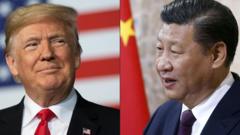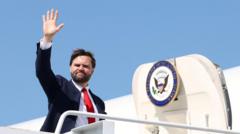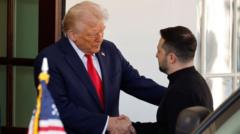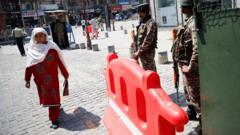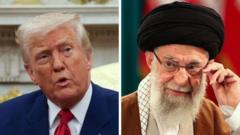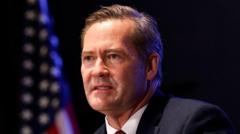President Trump has appointed Secretary of State Marco Rubio as acting national security adviser following Mike Waltz's unexpected ousting from the position. While Waltz transitions to a UN ambassador role, his previous missteps, including a sensitive chat group blunder, have left questions around his Senate confirmation viability.
Trump Restructures National Security Team: Ousting Waltz for UN Role
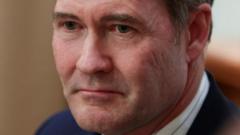
Trump Restructures National Security Team: Ousting Waltz for UN Role
In a surprising move, President Trump has replaced Mike Waltz as national security adviser, nominating him instead as ambassador to the United Nations, a decision that raises eyebrows amid scrutiny over Waltz's recent blunders.
In an unexpected reshuffling of his cabinet, President Donald Trump has removed Mike Waltz from his role as national security adviser, appointing him instead as ambassador to the United Nations, a choice that underscores internal party dynamics and the high-profile nature of the transition. Trump expressed his gratitude to Waltz via social media, framing the change as a promotion for Waltz, who now faces the daunting task of securing Senate confirmation while also grappling with recent controversies.
Waltz’s departure was prompted largely by a political misfire involving a sensitive chat group incident where he inadvertently included a journalist. This blunder has resulted in mounting scrutiny over his management and vetting of National Security Council staff, raising suspicions regarding his fit for the UN post. The shift, articulated in Trump's announcement, was based on the belief that Waltz might struggle to win the confidence of the Senate amidst these revelations.
Trump’s choice to have Secretary of State Marco Rubio serve as acting national security adviser simultaneously maintains continuity at the helm of U.S. foreign policy while continuing as chief diplomat. This dual role re-establishes a position last seen under Henry Kissinger, reflecting unprecedented consolidation of influence in a single individual.
The future trajectory of Waltz remains uncertain, as insiders hint at possible challenges in gaining Senate approval for his new role, partly due to the lingering signal incident. Current officials have indicated that Waltz’s departure, rather than being a harsh dismissal, has been handled diplomatically in consideration of his service history.
Critics see this move as indicative of the erratic nature that characterized the Trump administration’s earlier terms, with Waltz being the first senior official ousted in Trump's second term. In light of the strategic reshuffle, speculation around a potential successor to Waltz has emerged, with names like Steve Witkoff and Ric Grenell being discussed to fill the pivotal national security adviser role.
As the dust settles from this major administrative change, the implications of Waltz's proposed transition and the political discourse surrounding it promise to dominate discussions in the coming days. This change reflects the ongoing tensions and dynamics within the Trump administration, and how they navigate both internal challenges and external geopolitical pressures.
Waltz’s departure was prompted largely by a political misfire involving a sensitive chat group incident where he inadvertently included a journalist. This blunder has resulted in mounting scrutiny over his management and vetting of National Security Council staff, raising suspicions regarding his fit for the UN post. The shift, articulated in Trump's announcement, was based on the belief that Waltz might struggle to win the confidence of the Senate amidst these revelations.
Trump’s choice to have Secretary of State Marco Rubio serve as acting national security adviser simultaneously maintains continuity at the helm of U.S. foreign policy while continuing as chief diplomat. This dual role re-establishes a position last seen under Henry Kissinger, reflecting unprecedented consolidation of influence in a single individual.
The future trajectory of Waltz remains uncertain, as insiders hint at possible challenges in gaining Senate approval for his new role, partly due to the lingering signal incident. Current officials have indicated that Waltz’s departure, rather than being a harsh dismissal, has been handled diplomatically in consideration of his service history.
Critics see this move as indicative of the erratic nature that characterized the Trump administration’s earlier terms, with Waltz being the first senior official ousted in Trump's second term. In light of the strategic reshuffle, speculation around a potential successor to Waltz has emerged, with names like Steve Witkoff and Ric Grenell being discussed to fill the pivotal national security adviser role.
As the dust settles from this major administrative change, the implications of Waltz's proposed transition and the political discourse surrounding it promise to dominate discussions in the coming days. This change reflects the ongoing tensions and dynamics within the Trump administration, and how they navigate both internal challenges and external geopolitical pressures.







